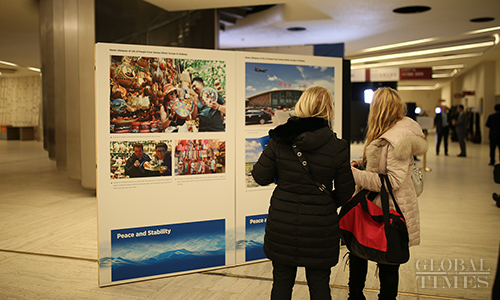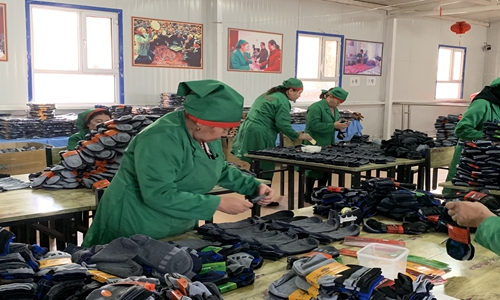HOME >> CHINA
Firms slam forced labor report as ‘full of lies’
By GT staff reporters Source:Global Times Published: 2020/3/2 19:40:38 Last Updated: 2020/3/2 23:55:26
Australian agency received US govt support, shows no knowledge of China

Two seamstresses are working in a traditional handcraft workshop at Hami, northwest China's Xinjiang Uygur Autonomous Region, March 24, 2019. (Xinhua/Wang Fei)
A report by an Australian think tank which claims the Chinese central government's "Xinjiang Aid" program forces Uygur people to work at suppliers across China for well-known global brands such as Apple, Nike and Volkswagen is a nefarious campaign that the West has launched to smear China and another "cock and bull story" on Xinjiang's so-called human right issues, said staff from the Chinese suppliers involved and local officials."This type of report is full of lies. The aid program is a beneficial scheme that helps Uygur people to earn income and learn new skills. Xinjiang workers are recruited in a formal and legal way, some through local personnel departments, and others via human resource agencies. They [the workers] are all voluntary," a local official surnamed Chen in Aksu prefecture, Northwest China's Xinjiang Uygur Autonomous Region told the Global Times on Monday.
The report issued by the Australian Strategic Policy Institute (ASPI) claims that under the program, 80,000 Uygur workers were forced to work in 27 factories in nine Chinese provinces outside Xinjiang between 2017 and 2019. They are subject to "constant surveillance" and live in "segregated dormitories," the report alleges.
China's Ministry of Foreign Affairs refuted the claims at Monday's regular press conference. The institute has repeatedly thrown out biased fallacies on issues related to Xinjiang, which is only another step to follow the anti-China forces of the US, aiming to smear and discredit the Chinese government's efforts of anti-terrorism in the Xinjiang region, said Zhao Lijian, spokesperson for the Foreign Ministry.
While extensively citing documents, academic research and even satellite imagery analysis, the report barely includes any conversations with frontline factory workers and bats away the key issue of how the Uygur workers are allegedly compelled to work or how they are surveilled by local officials.
A senior employee surnamed Che, of Nike supplier Qingdao Taekwang Shoes Co in Qingdao, East China's Shandong Province, told the Global Times that there were no extra restrictions placed on their 800 or so Uygur workers, compared with employees from other ethnic groups and other regions.
His words give the lie to the ASPI report, which cited a Washington Post article as saying that Uygur workers at the factory are barred from returning home for holidays. The Washington Post article claimed that the movements of the Uygur workers are monitored by local police officers.
"The report is definitely slander. Of course they [Uygur workers] can go anywhere they want. Just like the others, the Uygurs sign the same work contracts, which are usually valid for three years, but they can leave anytime they want," Che said.
Che said that the Uygur workers came to the factory in Shandong mainly because there are few opportunities in their hometowns, while salaries and employment are much more promising in the coastal city. Some Xinjiang employees could earn more than 2,000 yuan ($287.25) a month, with accommodation and daily meals provided by the employers.
An official in Hotan prefecture in Xinjiang told the Global Times on condition of anonymity that Xinjiang officials encourage locals to look for work outside the region to help lift themselves out of poverty. "The employment market in Xinjiang is not big enough," he said.
A Qingdao official involved in recruiting Uygur workers, who would speak only on condition of anonymity, told the Global Times on Monday that the local government has striven to protect the rights of Xinjiang migrant workers, such as offering transportation subsidies, ensuring no extra work hours and providing social insurance payment for them.

A Chinese NGO held a photo exhibition on Xinjiang at the UN Office in Geneva on Mon. More than 100 pictures and videos depicting a "beautiful, open, confident and richly-endowed Xinjiang that enjoys stable development, solidarity and harmony" were displayed for the visitors. Photo: Fan Lingzhi/GT
Statements from some other firms involved show the allegations are groundless.
For example, the report claims that Haoyuanpeng Clothing Manufacturing Co, headquartered in East China's Anhui Province, employed Uygur workers at its factory in Anhui. But a spokesperson for the garment maker told the Global Times that it has not recruited any workers from Xinjiang in its Anhui facility.
The reason companies outside of Xinjiang commissioned local HR agencies, rather than recruiting themselves in Xinjiang - a point that foreign media has been highlighting - is due to the language barrier and soaring travel costs, according to the Qingdao official.
He noted that the labor transfer program is not exclusive to Xinjiang, as it is carried out across China as part of the nation's poverty alleviation efforts, another fact the report fails to recognize.
Shen Yi, director of the Research Center for Cyberspace Governance at Fudan University in Shanghai, told the Global Times the ASPI report's citation of a transfer scheme under the auspices of "Xinjiang Aid" is totally wrong, which shows the report writers' ignorance of knowledge involving China and how they want to manipulate the truth into a hostile attack on Chinese government.
"The assistance program in Xinjiang, in fact, aims to channel financial support to Xinjiang from other regions of the country and send officials and professionals to work there," Shen said.
Nineteen Chinese provinces and municipalities provided more than 18.8 billion yuan (about $2.7 billion) of aid funds to Xinjiang in 2019, according to the Xinhua News Agency.
Doubts as to the integrity and credibility of the reports published by ASPI are growing among academics and industry insiders.
Some papers published in Australia have revealed that the institute has accepted funding support from the US government and arms dealers for a long time and it has been obsessed in processing and hyping various anti-China agenda, according to Foreign Ministry spokesperson Zhao Lijian.
It is the "vanguard" of anti-China forces and its academic reputation has been severely questioned, Zhao said.
The organization reportedly receives funding from Australia's Department of Defence and foreign governments, including from the US State Department's Global Engagement Center, to carry out studies to the benefits of its sponsors.

A local employee makes socks at a factory in Aksu Prefecture, Northwest China's Xinjiang Uygur Autonomous Region, in November. Photo: Li Xuanmin/GT
Denial from global companies
The ASPI report claims that the 27 factories are in the supply chain of at least 83 global brands, including Nike, Apple, BMW, Gap, Huawei, Nike, Samsung, Sony and Volkswagen.
However, a number of the firms named have sought to distance themselves from the report.
Volkswagen spokesman Nikolas Thorke told the Global Times on Monday that none of the mentioned firms are currently a direct supplier of Volkswagen. He added that there are and have been no indications of any human rights violations at the automaker's plant in Urumqi, regional capital of Xinjiang Uygur Autonomous Region.
When asked to comment on the matter, a spokesperson forFoxconn, a major supplier of Apple, told the Global Times that "there should be no such situation."
"We have not seen this report, but we work closely with all our suppliers to ensure our high standards are upheld," an Apple spokesperson was also quoted as saying in a report by a US-based media outlet.
Opportunities outside
While the report paints an error-riddled picture of Uygur workers forced to leave their hometowns and undertake tedious work thousands kilometers away, the Xinjiang people the Global Times talked with presented a drastically different picture.
Some of them said they cherished the opportunity or are eager to work outside Xinjiang, in expectation of more resources for self-development, more job opportunities and a career on the fast track.
Dierhati Adili, a 37-year-old Uygur, has been working in Shanghai for more than 10 years. After changing jobs several times, he is now a manager of an internet education company.
"I decided to stay after graduating from Fudan University in 2008 because I wanted to work in the internet industry. I don't know if I could have found a similar job if I had returned to Xinjiang. There are so many resources in Shanghai and the business environment is more vibrant," Adili told the Global Times on Monday.
A Uygur who asked to be referred to as Jiang, aged 35, has been running a bar in Chengdu, capital of Southwest China's Sichuan Province for almost 10 years, and married a local resident.
He told the Global Times that potential economic benefit is what drove him to Chengdu in the first place.
"People were welcoming to me at the very beginning when I couldn't speak their dialect," Jiang said. He said that his bar became popular after he added Xinjiang elements, such as carpets, music and desserts.
Analysts said it is not unusual for laborers from Xinjiang to find work in other cities. They are just part of China's massive population of migrant workers.
Posted in: SOCIETY